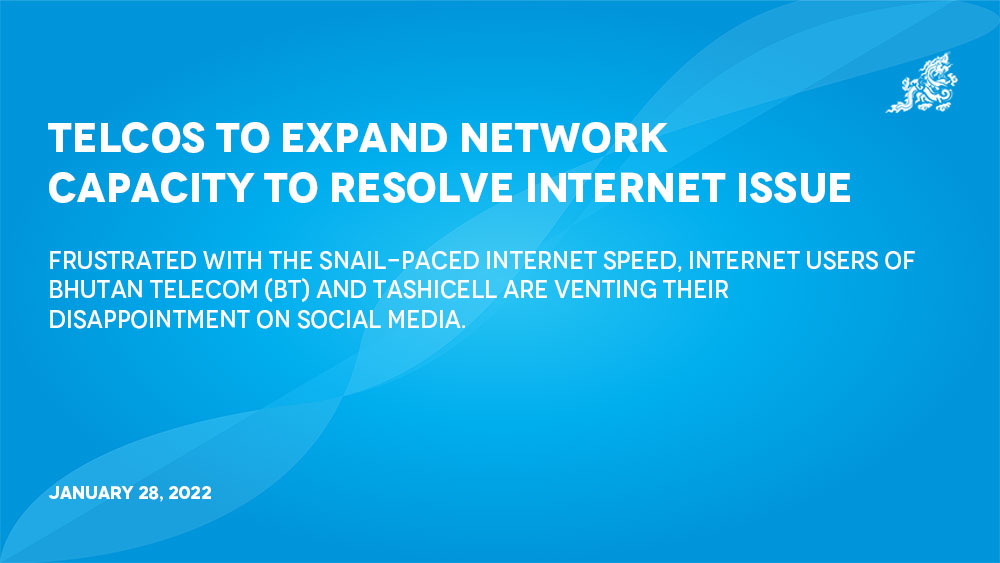Phub Dem
Frustrated with the snail-paced internet speed, internet users of Bhutan Telecom (BT) and Tashicell are venting their disappointment on social media.
Many social media users blamed the introduction of 5G for slower and unreliable internet connections.
A tech entrepreneur, Tashi, said that he had been experiencing unreliable internet connection, extending online meetings for hours. “It is difficult to even download files.”
He said telcos’ user base and network capacity should grow simultaneously.
Many also questioned why the telecom companies rushed to upgrade to 5G when some pockets of the country are not even connected with 4G and 3G networks.
Internet services in the country have seen a drastic surge in usage of about 30 percent compared to pre-lockdown.
BT and TashiCell clarified that 5G slowing 4G services is not true, adding that 5G, the latest mobile technology that provides abundant network resources to accommodate maximum high-speed internet users, was introduced to resolve the clogging on 4G network.
However, according to both the companies, the migration process takes time since most of the handsets in the market do not support 5G services, adding that not many 4G users were keen on migrating to the 5G network.
According to TashiCell, slow mobile internet is caused by the increase in 4G users, consumption per user, and service providers’ inability to construct new sites to cater to the increasing demand due to site acquisition challenges.
TashiCell users in December grew by 9 percent compared to November and consumption per user increased by 12 percent. “As the worsening state of 4G network coincided with the launch of 5G, the customers started believing that 5G has slowed down 4G, which is not true,” TashiCell added.
TashiCell management also claimed that with the imposition of lockdown, mobile data consumption has increased by nearly 30 percent compared to pre-lockdown as office goers resort to using mobile networks to work from home during the lockdown.
BT’s director of Technical Department Karma Tshewang said that BT’s 4G network capacity, despite all the enhancement efforts, could not cater to the ever-increasing demand of customers for mobile internet.
He said that BT saw an abnormal pressure on internet infrastructure during the lockdown, due to which the customers have been experiencing slower mobile data speed.
While there is no increase in customers, BT saw about 23 percent increase in usage by the same number of users in 4G traffic during the lockdown.
The other reason could be because, in some of the buildings, indoor signal coverage is poor, leading to slower internet, he said. “Parts of buildings or any concrete structures facing away from the mobile towers get weaker signal strength as compared to ones facing the mobile towers.”
Resolving congestion
TashiCell officials said that the company had commissioned two new sites at Changjiji and Changjalu areas as Thimphu city has the highest network congestion level.
They also said that the company will air two mobile sites called Cell-On-Wheels (COW) in Babesa area, which has the worst network clogging issues within this week.
Officials said other than expanding the network’s capacity, there was no other option to resolve the clogging.
They said network capacity expansion can be achieved by constructing new sites and introducing new technologies like 5G that leverage the existing site infrastructure.
TashiCell management is of the stand that the main challenge faced by the service providers is in obtaining the ‘right of way’ to build new tower sites to extend optic fibre.
The company calls on cross-sectoral support to the service providers. “All the relevant stakeholders must come together and chart a way forward to enable telecom service providers to acquire ‘right of way’. It is essential to build sites to facilitate the rapid development of telecom infrastructure.”
Karma Tshewang said BT had been enhancing the capacities of the existing 4G towers and installing densifying sites on 15-metre monopoles for clusters like Thimphu, which is expected to supplement the power and coverage of the main towers.
Other than enhancing capacities where technically feasible based on the need, he said that it was not viable for any telcos to invest in extra capacities in advance to cater to the increased demands during times like lockdowns or any disasters.
However, he said that as the network and handset ecosystem for 5G matures, there won’t be speed issues, adding that 5G was designed to operate in higher frequencies than 4G technology and can cater 10-20 times faster mobile data speed.
He added that BT encouraged customers to choose broadband and leased line subscriptions to meet internet connection at home. “BT aims to decongest mobile data networks by offloading some of the traffic to the fixed-line network.”


